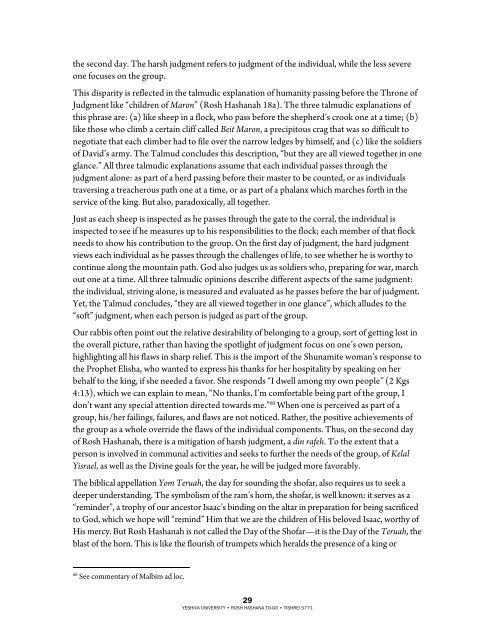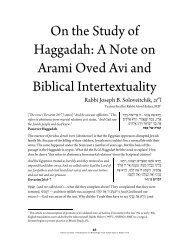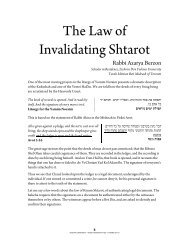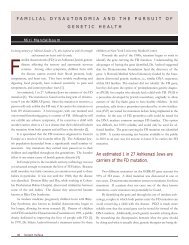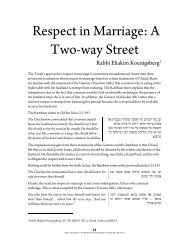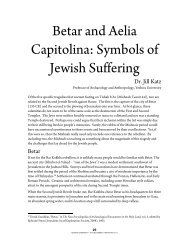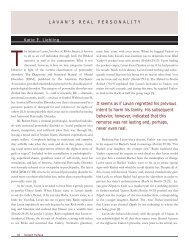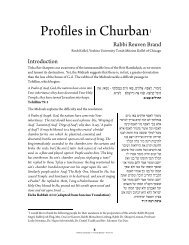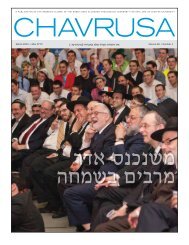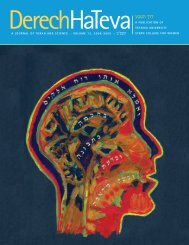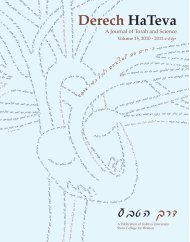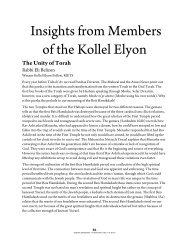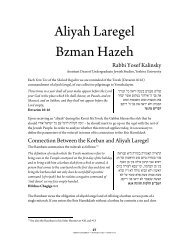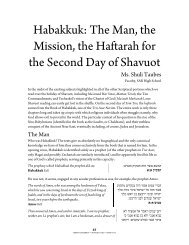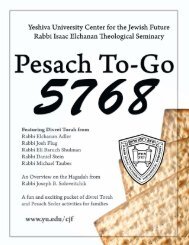YESHIVA UNIVERSITY • ROSH HASHANA TO-GO ... - YUTorah.org
YESHIVA UNIVERSITY • ROSH HASHANA TO-GO ... - YUTorah.org
YESHIVA UNIVERSITY • ROSH HASHANA TO-GO ... - YUTorah.org
Create successful ePaper yourself
Turn your PDF publications into a flip-book with our unique Google optimized e-Paper software.
the second day. The harsh judgment refers to judgment of the individual, while the less severe<br />
one focuses on the group.<br />
This disparity is reflected in the talmudic explanation of humanity passing before the Throne of<br />
Judgment like “children of Maron” (Rosh Hashanah 18a). The three talmudic explanations of<br />
this phrase are: (a) like sheep in a flock, who pass before the shepherd’s crook one at a time; (b)<br />
like those who climb a certain cliff called Beit Maron, a precipitous crag that was so difficult to<br />
negotiate that each climber had to file over the narrow ledges by himself, and (c) like the soldiers<br />
of David’s army. The Talmud concludes this description, “but they are all viewed together in one<br />
glance.” All three talmudic explanations assume that each individual passes through the<br />
judgment alone: as part of a herd passing before their master to be counted, or as individuals<br />
traversing a treacherous path one at a time, or as part of a phalanx which marches forth in the<br />
service of the king. But also, paradoxically, all together.<br />
Just as each sheep is inspected as he passes through the gate to the corral, the individual is<br />
inspected to see if he measures up to his responsibilities to the flock; each member of that flock<br />
needs to show his contribution to the group. On the first day of judgment, the hard judgment<br />
views each individual as he passes through the challenges of life, to see whether he is worthy to<br />
continue along the mountain path. God also judges us as soldiers who, preparing for war, march<br />
out one at a time. All three talmudic opinions describe different aspects of the same judgment:<br />
the individual, striving alone, is measured and evaluated as he passes before the bar of judgment.<br />
Yet, the Talmud concludes, “they are all viewed together in one glance”, which alludes to the<br />
“soft” judgment, when each person is judged as part of the group.<br />
Our rabbis often point out the relative desirability of belonging to a group, sort of getting lost in<br />
the overall picture, rather than having the spotlight of judgment focus on one’s own person,<br />
highlighting all his flaws in sharp relief. This is the import of the Shunamite woman’s response to<br />
the Prophet Elisha, who wanted to express his thanks for her hospitality by speaking on her<br />
behalf to the king, if she needed a favor. She responds “I dwell among my own people” (2 Kgs<br />
4:13), which we can explain to mean, “No thanks, I’m comfortable being part of the group, I<br />
don’t want any special attention directed towards me.” 60 When one is perceived as part of a<br />
group, his/her failings, failures, and flaws are not noticed. Rather, the positive achievements of<br />
the group as a whole override the flaws of the individual components. Thus, on the second day<br />
of Rosh Hashanah, there is a mitigation of harsh judgment, a din rafeh. To the extent that a<br />
person is involved in communal activities and seeks to further the needs of the group, of Kelal<br />
Yisrael, as well as the Divine goals for the year, he will be judged more favorably.<br />
The biblical appellation Yom Teruah, the day for sounding the shofar, also requires us to seek a<br />
deeper understanding. The symbolism of the ram’s horn, the shofar, is well known: it serves as a<br />
“reminder”, a trophy of our ancestor Isaac’s binding on the altar in preparation for being sacrificed<br />
to God, which we hope will “remind” Him that we are the children of His beloved Isaac, worthy of<br />
His mercy. But Rosh Hashanah is not called the Day of the Shofar—it is the Day of the Teruah, the<br />
blast of the horn. This is like the flourish of trumpets which heralds the presence of a king or<br />
60 See commentary of Malbim ad loc.<br />
29<br />
<strong>YESHIVA</strong> <strong>UNIVERSITY</strong> <strong>•</strong> <strong>ROSH</strong> <strong>HASHANA</strong> <strong>TO</strong>-<strong>GO</strong> <strong>•</strong> TISHREI 5771


